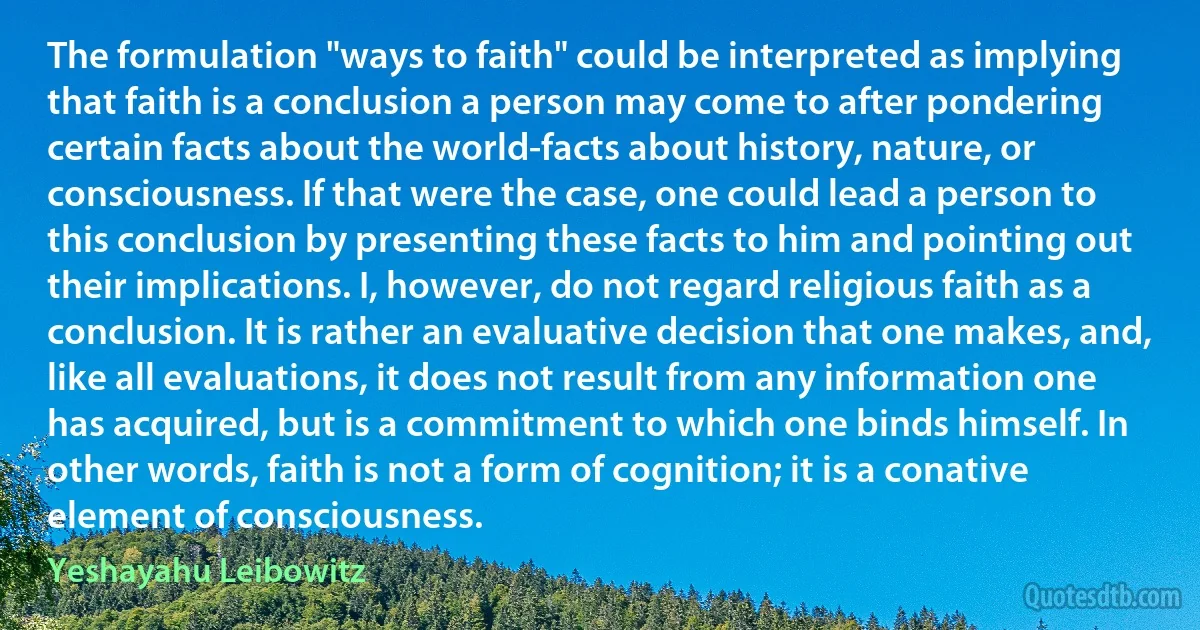
The formulation "ways to faith" could be interpreted as implying that faith is a conclusion a person may come to after pondering certain facts about the world-facts about history, nature, or consciousness. If that were the case, one could lead a person to this conclusion by presenting these facts to him and pointing out their implications. I, however, do not regard religious faith as a conclusion. It is rather an evaluative decision that one makes, and, like all evaluations, it does not result from any information one has acquired, but is a commitment to which one binds himself. In other words, faith is not a form of cognition; it is a conative element of consciousness.
Yeshayahu LeibowitzRelated topics
case certain cognition element faith form formulation history implying lead nature person pondering result words facts waysRelated quotes
I have presented the periodic table as a kind of travel guide to an imaginary country, of which the elements are the various regions. This kingdom has a geography: the elements lie in particular juxtaposition to one another, and they are used to produce goods, much as a prairie produces wheat and a lake produces fish. It also has a history. Indeed, it has three kinds of history: the elements were discovered much as the lands of the world were discovered; the kingdom was mapped, just as the world was mapped, and the relative positions of the elements came to take on a great significance; and the elements have their own cosmic history, which can be traced back to the stars.

Peter Atkins
What is a charitable heart? It is a heart which is burning with love for the whole creation, for men, for the birds, for the beasts ... for all creatures. He who has such a heart cannot see or call to mind a creature without his eyes being filled with tears by reason of the immense compassion which seizes his heart; a heart which is softened and can no longer bear to see or learn from others of any suffering, even the smallest pain being inflicted upon a creature. That is why such a man never ceases to pray for the animals ... [He is] ... moved by the infinite pity which reigns in the hearts of those who are becoming united with God.

Isaac the Syrian
Do everything simply and meekly. Do nothing with an ulterior motive. Don't say, I'll do this in order to have that result, but do it naturally, without taking cognizance of it. That is, pray simply and don't think about what God will bestow on your soul. Don't make any calculations. You know, of course, what God bestows when you enter into communion with Him, but it is as if you don't know. Don't discuss the matter even with yourself. So when you repeat the prayer, "Lord Jesus Christ, have mercy on me”, say it simply and ingenuously and think of nothing other than the prayer. These are very delicate matters and the intervention of the grace of God is required.

Porphyrios of Kafsokalyvia
What is this wide-spread component of the surface of the earth? and whence did it come?
You may think this no very hopeful inquiry. You may not unnaturally suppose that the attempt to solve such problems as these can lead to no result, save that of entangling the inquirer in vague speculations, incapable of refutation and of verification.
If such were really the case, I should have selected some other subject than a "piece of chalk" for my discourse. But, in truth, after much deliberation, I have been unable to think of any topic which would so well enable me to lead you to see how solid is the foundation upon which some of the most startling conclusions of physical science rest.

Thomas Henry Huxley
These pseudo‑events which flood our consciousness must be distinguished from propaganda. The two do have some characteristics in common. But our peculiar problems come from the fact that pseudo‑events are in some respects the opposite of the propaganda which rules totalitarian countries. Propaganda - as prescribed, say, by Hitler in Mein Kampf - is information intentionally biased. Its effect depends primarily on its emotional appeal. While a pseudo‑event is an ambiguous truth, propaganda is an appealing falsehood. Pseudo‑events thrive on our honest desire to be informed, to have "all the facts,” and even to have more facts than there really are.

Daniel J. Boorstin
